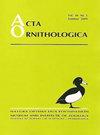阿根廷中部农业集约化梯度下普通捕食者美国红隼的日粮变化
IF 1.3
4区 生物学
Q3 ORNITHOLOGY
引用次数: 2
摘要
摘要以牺牲自然栖息地为代价的农业扩张和农业生产的集约化进程是全球范围内生物多样性和生态系统服务大规模丧失的主要原因。这一过程会完全改变鸟类的食物供应,并对它们的饮食和繁殖性能产生负面影响。在土地利用变化限制猛禽食物资源的假设下,我们的目的是分析在巢箱和洞穴中繁殖的美国Kestrel Falco sparverius种群中自然区域和不同农业集约化程度区域(天然林、传统农田、集约农田)之间巢食的变化。通过对2012-2013年繁殖季节收集的颗粒和猎物遗骸的分析,我们发现不同地区的饮食多样性没有差异,三个地区的饮食由节肢动物垄断。然而,不同地区的饮食成分确实发生了变化。从数字上看,直翅目在这三个地区的饮食中占主导地位,尽管在森林地区的比例更高。脊椎动物的消费频率受到天然林和残茬面积的正向影响,而大豆覆盖对消费的影响是负向的。在这两个农业区,不同的节肢动物群补充了饮食,这表明土地利用的变化会在美国红隼身上产生功能反应,从而能够利用每个采样区的可用资源。在农业集约化框架内对饮食变化及其与人口统计学参数和个体表现的关系进行长期分析,将有助于评估饮食变化对红隼的影响。本文章由计算机程序翻译,如有差异,请以英文原文为准。
Diet Variation of a Generalist Predator, the American Kestrel Falco sparverius, in a Gradient of Agricultural Intensification in Central Argentina
Abstract. Agricultural expansion at the expense of natural habitats and the intensification processes in agricultural production are globally among the main causes of biodiversity and ecosystem services loss at large scale. This process can completely alter food provision for birds and have negative consequences for their diet and breeding performance. Under the hypothesis that changes in land use limit food resources for raptors, our aim was to analyze variation in nestling diet between natural areas and areas with different degrees of agricultural intensification (natural forest, traditional farmland, intensive farmland) in a population of American Kestrel Falco sparverius breeding in nest boxes and cavities. Through the analysis of pellets and prey remains collected during the reproductive season of 2012–2013 we found no differences in diet diversity among areas and the diet in the three areas was monopolized by arthropods. However, the diet did change in composition between areas. Numerically, Orthoptera dominated the diet in the three areas, although with a higher percentage in the forest area. The frequency of vertebrate consumption was affected positively by the area occupied by natural forest and stubble, while the soybean cover affected the consumption in a negative way. In both agricultural areas, the diet was complemented with different groups of arthropods suggesting that changes in land use generate a functional response in the American Kestrel that is able to take advantage of available resources in each sampling area. Long-term analysis of diet variation within the framework of agricultural intensification and its relation with demographic parameters and individual performance will allow to evaluate the impact of this variation in the diet on kestrels.
求助全文
通过发布文献求助,成功后即可免费获取论文全文。
去求助
来源期刊

Acta Ornithologica
生物-鸟类学
CiteScore
2.10
自引率
0.00%
发文量
14
审稿时长
>12 weeks
期刊介绍:
Publishes scientific papers (original research reports, reviews, short notes, etc.) and announcements from all fields of ornithology. All manuscripts are peer-reviewed.
Established in 1933 as Acta Ornithologica Musei Zoologici Polonici, since 1953 continued under the present title.
Published twice a year by the Natura Optima Dux Foundation under the auspices of the Museum and Institute of Zoology, Polish Academy of Sciences.
 求助内容:
求助内容: 应助结果提醒方式:
应助结果提醒方式:


